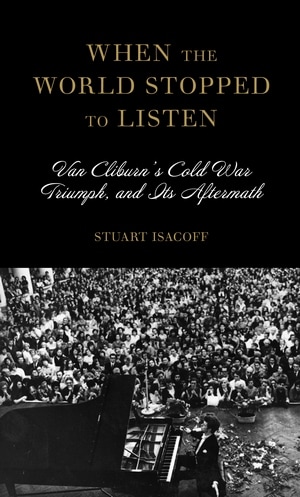
In his new book, When the World Stopped to Listen: Van Cliburn’s Cold War Trumph and Its Aftermath, Stuart Isacoff brings both a pianist’s insights and a historian’s rigor to an event that shook the musical world – indeed, the world at large – almost six decades ago. It was in 1958, at the height of the Cold War, that a lanky young Texan went to Moscow and won the gold medal for piano at the first Tchaikovsky Competition.
Although Isacoff didn’t know Cliburn personally (at least, he makes no such claim), his presentation of the pianist is detailed and vivid. The portrait drawn here is not always flattering: for instance, Isacoff notes the overbearing influence of the pianist’s mother and first teacher, Rildia Bee O’Bryan Cliburn, his superstitious fascination with astrology, and his ill-placed faith in an amphetamine-dispensing quack, Max “Dr. Feelgood” Jacobson. Cliburn also is described as naïve, irresponsible, and plagued with performance anxieties. (Isacoff does not say much about Cliburn’s homosexuality, except to point out that the 1950s were not a time of tolerance.)
As for Cliburn’s pianism, the author fairly gushes over his best playing. He describes Cliburn’s “perfect” prize-winning Moscow performance of the Tchaikovsky Piano Concerto No. 1 in the most effusive terms. “Van’s interpretation was extraordinary. The work’s thundering octaves and delicate filigree were perfectly rendered. Musical lines soared and swooped and darted swiftly to and fro, unfolding a narrative that sounded both noble and ardent, majestic fanfares alternating with lovelorn airs.”
However, When the World Stopped to Listen isn’t just about music. It has been noted by historians and political scientists that the Cold War was fought on many fronts: in Cuba and Korea, in the “Race for Space,” at the Berlin Wall, at the Fischer-Spassky chess tournament, and anywhere else America found itself in conflict with the USSR. Viewed in this context, the Tchaikovsky Competition was yet another of these battle-fronts, as Isacoff explains in a chapter called “A Tale of Two Nations.”
Isacoff points out that the Soviets had several reasons to launch the competition. Such an event, it was hoped, would boost tourism. It would show the USSR to be a culturally sophisticated nation. And with a classical music competition, the Soviets believed they were playing to their own strengths: Isacoff lists Vladimir Ashkenazy, Lev Vlassenko, and Naum Shtarkman as young Moscow-trained pianists who had won top honors in international contests.
On the other hand, the Soviets struggled with the democratic structure of a major international music competition. For such an event to be taken seriously by the wider world, an international jury would have to be assembled, made up of prominent musicians who would vote according to their expertise. There would be no way to control the result, whatever the political consequences.
However, there was no getting around politics in the USSR – and when it became apparent that an American was likely to win, General Secretary Nikita Khrushchev was called upon to approve the decision. Here, Isacoff relies on the memoirs of Sergei Khrushchev (Nikita’s son). “As the jury is insisting on it," said Nikita, "we do not need to interfere. They are professionals. And having an American win is even good; we will show the world our impartiality.”
The last four chapters of the book deal with Cliburn’s post-Tchaikovsky career. After being fêted with a ticker-tape parade in New York, the pianist concertized extensively. He recorded, tried his hand at conducting, and helped to found the Van Cliburn International Piano Competition. As his career wound down, he moved from New York to an estate near Fort Worth and formed a relationship with a young musician named Tommy Smith. The final chapter of the book ends, like Cliburn’s career, with a whimper rather than a bang.
Isacoff makes strong arguments for the pianist’s unique role in history. “He had, after all, helped change the world, inspiring love and admiration in generations of Russians and propelling efforts at diplomatic exchanges between the rival superpowers…. Van had served as a constant reminder that even between hostile nations the real possibility of ‘soft power’ and effective diplomacy remained.” Few musicians can claim such a legacy.
© Colin Eatock 2017
Since this review was published, I have learned that Stuart Isacoff did indeed know Van Cliburn.
 RSS Feed
RSS Feed

